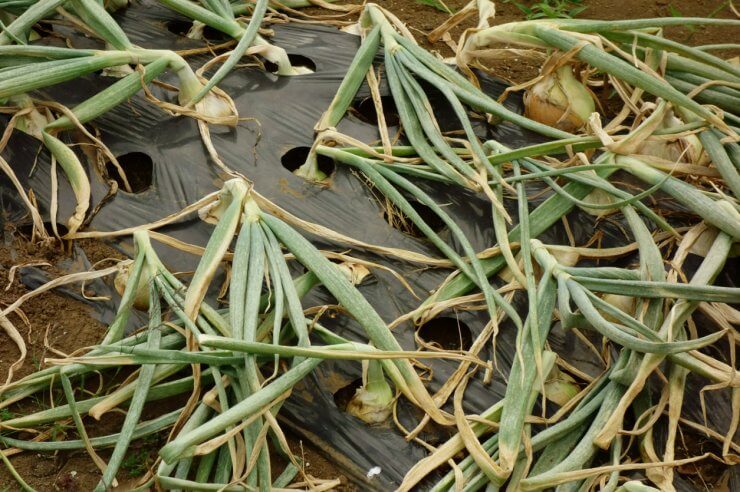
Sick green onions in the garden
Scallion plant diseases are caused by bacteria, fungi, and viruses. The diseases can spread through the soil, water, air, infected tools, animals, and even gardeners themselves. Here’s a sample of some of the diseases that could affect your scallions. When in doubt, take pictures and contact your local garden center or extension center. If you take a sample in for someone to examine, make sure it’s in a sealed bag. The last thing you want to do is spread leaf blight around.
Botrytis Leaf Blight
Botrytis leaf blight can live in leaf debris or soil, and the spores are spread by the wind. If the leaves are wet and the temperature is even moderate (72 to 75 degrees F), scallions can be susceptible. Look for small yellow to white, oval-shaped sunken spots on the leaves.
The best way to control this leaf blight is to keep the spores out of the soil. In some cases that will mean rotating all allium plants (scallions, onions, leeks, garlic) out of rotation for two to three years. Any infected plants must be destroyed (not composted, not buried, not burned) to keep the fungus out of the soil. In some cases, this won’t be enough to get rid of the infection; you may need to apply fungicide as a protective measure.
Downy Mildew
Downy mildew appears on older leaves in oval patches that are slightly lighter than the rest of the leaves. Moisture feeds this mildew: infected areas develop gray fungal strands packed with spores that can spread to healthy plant tissue. The infected areas can be violet or purple, confusing the infection with purple blotch (see below). Unchecked, downy mildew will kill off the leaves and infect the bulbs, which will become soft and watery.
One of the best ways to avoid downy mildew is to make sure your plants are properly—but not overly—watered. You should plant in clean soil that’s free of spores. Keep the weeds out to keep airflow open; this will also help keep the plants dry and less susceptible to mildew. If necessary, you can apply a fungicidal soap to combat the infection.
Purple Blotch
Purple blotch is a fungus that affects the tops and bulbs of onions and other allium crops. The first sign of trouble is the appearance of small tan spots on the leaves. These lesions sink quickly and expand up and down the leaves. Some of the lesions will have a band of purple tissue around them (hence the name). This fungus travels on wind and rain, and the leaves of the scallions are more prone to infection as the plants develop.
The best prevention is to rotate all allium plants out of planting for two to three years. Protective fungicides can be helpful, but they’re mostly used in commercial applications.
Destroy infected plants
If you have infected plants, throw them away. Do not put them on the compost pile. Remember, fungal infections are caused by spores—which can travel on wind and water and live in the soil—just waiting for their next victim. Think twice about burning infected plants, since the fungal spores can travel on the wind.
Have you had problems with diseases attacking your scallion plants? What’s the worst disease you’ve seen in scallions? Please tell us how you treat and prevent diseases from destroying your scallion crop.


 Previous
Previous

